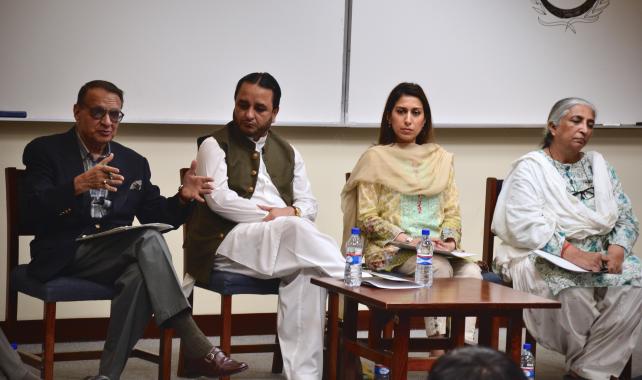
LUMS Model UN Society (LUMUN) hosted its first panel discussion for this academic year titled “The Future of South Asia” on October 19, 2016. The panelists were invited from diverse backgrounds to lend expert insight into the varied challenges faced by South Asia and to hint at plausible solutions to these issues.
Ambassador (Retd.) Shamshad Ahmad, the Former Foreign Secretary of Pakistan and Former Permanent Representative of Pakistan to the UN, was the first esteemed panelist. The second panelist was the honourable Chief Minister of Gilgit Baltistan, Hafiz Hafeez ur Rehman. The panel also featured an academic, Dr. Mariam Chughtai, who is the Country Director Pakistan for the Harvard South Asia Institute. The panel was also graced by the presence of a grassroots activist, Diep Saeeda, who works in the area of peace and conflict resolution with a major focus on religious minorities in Pakistan. The discussion was moderated by Pakistan's former ambassador to Syria, Malaysia & Morocco, Ambassador (Retd.) S. Azmat Hassan.
The discussion was formally handed over to the moderator after a brief welcome from the General Secretary and the floor was given to the panelists to share their insights individually. Chief Minister Hafeez ur Rehman started the discussion by emphasising on the dependence of South Asia’s prosperity on peaceful relations and commented on the paramount importance of the Gawadar Corridor in potentially defining the future of South Asia. He also talked about the failure of SAARC due to India’s hegemony over the South Asian LDCs (Least Developed Countries).
The second panelist, Shamshad Ahmad, charmed the audience with his wit and furthered the discussion on the Gawadar Corridor by elucidating that no political party should take credit for the OBOR (One Belt One Road) initiative which, he claimed, sprang up in response to America’s Asian Pivet Initiative. He elaborated on his fear that this project too would become “another Kalabagh Dam” if not “taken out of the clutches of Islamabad’s bureaucracy” and rigorously implemented. On speaking about the interrelations between South Asian states he shared a tweet that used the metaphor of monsoon to hint at the similarities between the South Asian states and how it should be translated into geopolitics that can lead to a bright future for the region as a whole.
The third speaker, Diep Saeeda, candidly connected with the audience and shattered some myths about the quality of life minority groups experience in Pakistan. Her ingenuity was greatly appreciated by the audience and her reflective contributions to the discussion provoked a defensive response in the panel as well.
Dr. Mariam Chughtai talked about the failure of developmental goals in the region, particularly in the area of education. She criticised the UN’s flaky policies on education and how the ‘Education for All’ initiative brought a huge lump of the youth to school but didn’t factor in the quality of the education. The result was the cramming of thousands within the same sloppy and congested infrastructure of education. She invited the audience to critically view the UN’s policies and functions and to ‘learn from the past'.
After presenting their respective views on the topic, the panelists engaged in a question and answer session with the audience that comprised the last twenty minutes of the discussion.
LUMUN takes pride in creating the space to have this extremely important conversation and is honoured to have hosted a discussion by such an esteemed panel. The first of many talks to come, “The Future of South Asia” was analysed in light of political, academic and humanitarian concerns in a greatly enlightening way and was well-received by the audience.







